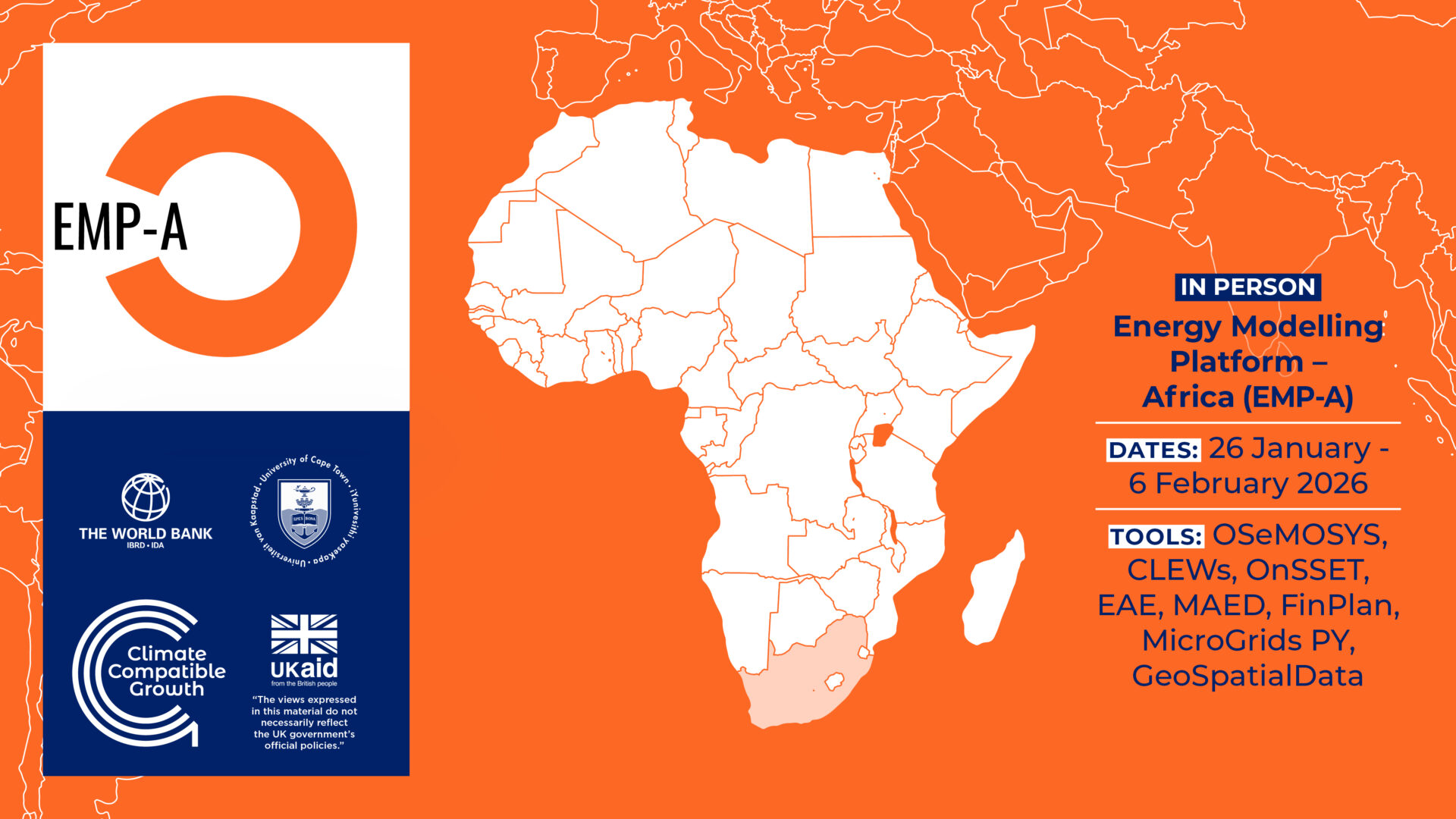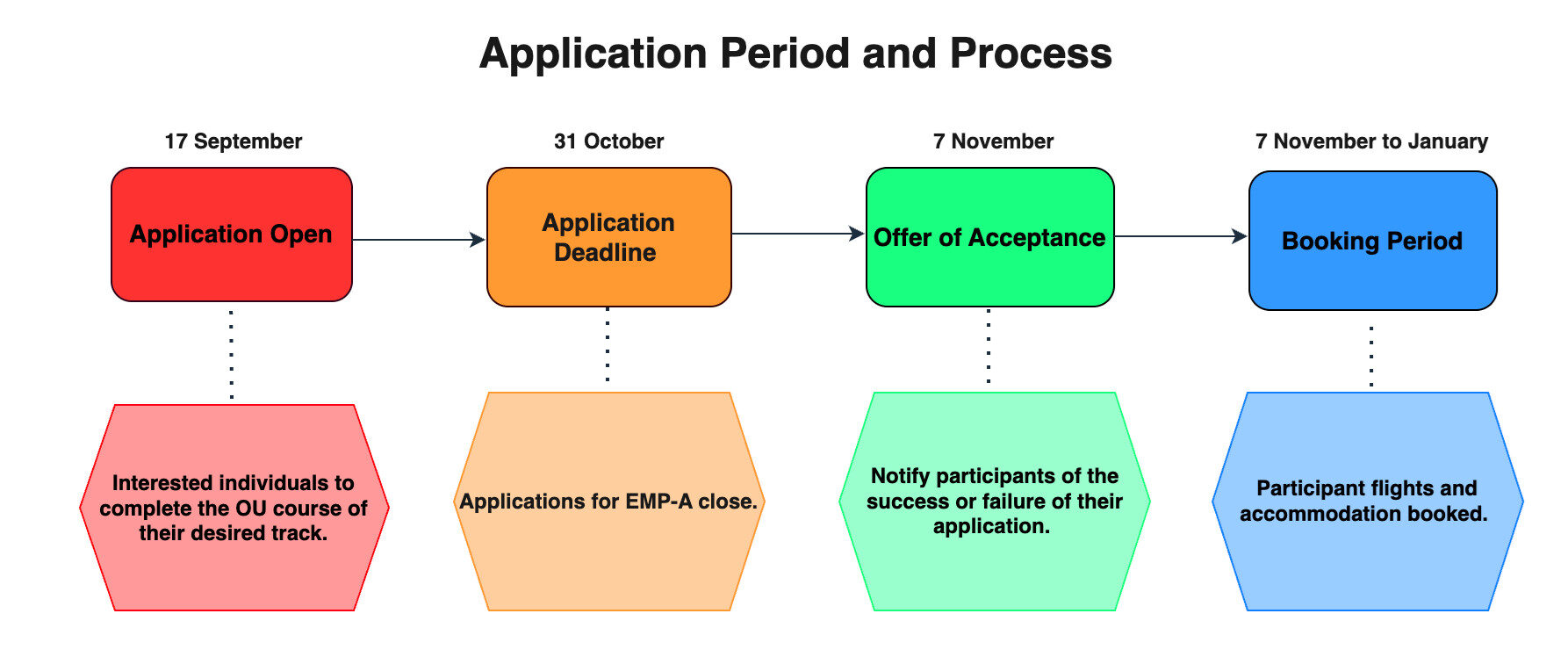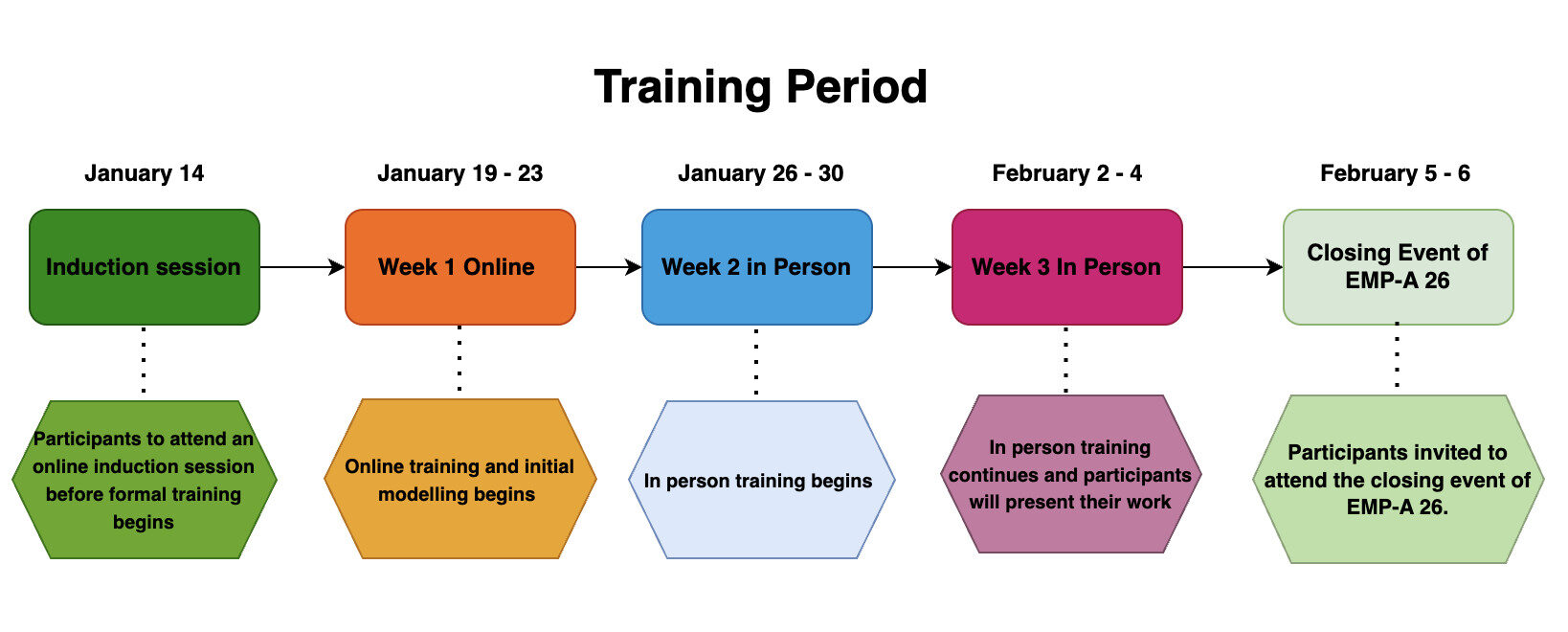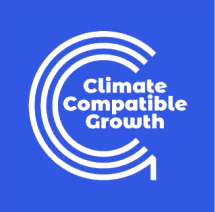This is the seventh round of the Energy Modelling Platform for Africa (EMP-A), which started in 2018 and aims to transfer skills in models and tools for energy planning needs.
The overarching objectives of the EMP-A platform are to:
- Gather the energy planning and modelling community in Africa to share experiences, models, and data in climate, land, energy, and water systems.
- Support human and institutional capacity in Africa for integrated energy modelling and investment planning.
- Support the development of centres of excellence for energy planning in Africa
- Promote efficient and widespread use of (cost free) open-source modelling tools to support the implementation of the SDGs, the Paris Agreement, and Africa’s Agenda 2063

CCG is introducing a more structured, long-term approach to capacity development. While one-off attendance is still available, for certain courses in the EMP-A we will be prioritising applications that are a part of a longer process, known as Bootcamps. These involve more in-depth, extended engagements (typically 6–18 months) that produce a clear output. Detailed information about the Bootcamps and application options can be found below.
There is no fee to attend; however, competition for space is high, and space is limited. There are also some funding opportunities.
Bootcamp applications will be prioritised for certain tracks (please see ‘Application’ section for details
EMP-A 2026 will take place from 19–23 January (online) and 26 January–6 February at the University of Cape Town (UCT) in Cape Town, South Africa.
The full concept note is available for download here.
There are ten courses available as part of this EMP. See below for details.
How to Apply
Unlike previous EMP applications, there are now four types of applications that can be submitted. You can still apply to attend the EMP on a one-off basis, but these applications are not prioritised for certain courses. Instead, CCG is shifting its focus to providing longer-term support aimed at helping you to achieve a particular goal, such as a research paper, enhancing university curricula, or technical assistance. These are part of Bootcamps which include EMP attendance as part of the package. You can learn more about the different options in the Applications section, along with the link to the application form.
All applications, whether Bootcamp or One-off, require you to complete the Open University course for the tool you wish to be trained in, along with completion of the ‘Modelling, policy and political economy‘ course. For example: if you would like to apply for MAED, you would need to complete the course on the Open University website for MAED.
Once completed, you will receive a certificate from the Open University. The certificate must be attached to your application form.
Courses
All the courses are available free via the Open University (OU) [Links open in a new tab].
- Energy Access Explorer (EAE): Data-driven, Integrated and Inclusive Energy Planning
- Energy and Flexibility Modelling: OSeMOSYS and IRENA FlexTool
(Windows and Mac OS: Windows course also available in French) - FINPLAN (Financial Planning of Energy Infrastructure) and Investment Pipelines (also available in French)
- Geospatial Data Management for Energy Access Modelling and Planning
- Geospatial Clean Cooking access modelling (OnStove)
- Introduction to CLEWS: Climate, Land-Use, Energy and Water Systems (also available in French)
- MAED (Model for Analysis of Energy Demand) (also available in French)
- MicroGridsPY and RAMP
- OnSSET/The Global Electrification Platform (also available in French)
Application Period:
17 September 2025 to 31 October 2025

- 17 September 2025 – Applications open. Interested individuals should start the OU course to complete it before the application deadline.
- 31 October 2025 – Application deadline at 12pm GMT.
- 7 November 2025 – Participants are notified of whether their application was successful or not. Unsuccessful applicants may still be considered for online participation.
- 7 November 2025 to January 2026 – Participant flights and accommodation are booked. Please note, full-time commitment at training sessions is required.
Training Period
The courses are split into two parts:
Self-paced study: You complete an OU course of your choice and attach the certificate of completion. Week 1 of the course provides online coaching and troubleshooting to further modelling knowledge.
In-depth hands-on training: In-person interactive training with dedicated trainers*. The coaching will help you develop a national case study, which you will then present as an ‘elevator pitch’ to a senior decision-maker.

- Induction session (online) [14 Jan]
- Week 1 of training (online): 19–23 January
Training and initial modelling begins - Week 2 of training (in-person): 26–30 January
Training and modelling continues in-person - Week 3 (in-person) 2–4 February
Participants prepare presentations and reports - High Level Meeting (5–6 February)
Participants are invited to attend and present at a High Level Meeting
Applications
Please note that there are four types of application:
- One-off attendance – This form of attendance matches the regular EMP attendance, whereby there is no long-term engagement envisioned. If your attendance is with a pre-determined sponsor, please apply here.
- Scholars’ Bootcamp – The Scholars’ Bootcamp, aimed at academics (alumni or new) envisions a 6- to12-month engagement, at the end of which the team produces a research paper, submitting it for peer-reviewed publication.
- FlatPack Bootcamp – The FlatPack Bootcamp is also aimed at academics (alumni or new). This is a 6-month journey that begins with hands-on training in one of CCG’s energy or financial modelling tools. After the initial training, academics receive continued support from CCG experts to help them adapt and enrich their existing courses. The goal is to successfully embed one or more CCG tools into the curriculum of a BSc, MSc, or PhD programme.
- Partners’ Bootcamp – The Partners’ Bootcamp, aimed at IO’s conducting TAs envisions a 6–18-month engagement, whereby the IO outsources their capacity building activities in energy modelling, with the Bootcamp also supporting the production of the final document of the TA.
All information regarding the various bootcamps can be found here. For OSeMOSYS, CLEWs, FINPLAN, MAED, OnSSET, and EAE Bootcamp applications will be prioritised.
***Please follow this link to select your application type and apply. [opens in new tab]***
All the required documentation is stated in the application form. Please ensure you read this carefully in advance and submit all necessary material. If you have any questions regarding what you need to submit, please email OpTIMUS Inquiries.
Applicants will need a relatively new computer (with at least 8 GB of RAM) and a stable internet connection in instances if online participation is accepted. Some courses have additional requirements.
Funding
Funding will be made available for some in-person participants to cover the cost of flights and/or accommodation (funding will be prioritised for Bootcamp applicants). However, participants not selected for funding can still attend at their own expense or can be funded by other organisations. Please specify in your application if you wish to be considered for funding.
Contact
If you have any questions about any part of the EMP-A please get in touch with OpTIMUS Inquiries.
Partners

In alphabetical order:
- 2050 Pathways Platform
- African Climate Policy Centre – United Nations Economic Commission for Africa (ACPC UNECA)
- Climate Compatible Growth Programme (#CCG)
- Energy Sector Management Assistance Program (ESMAP)
- Green Grid Initiative (GGI)
- Imperial College London (ICL)
- International Atomic Energy Agency (IAEA)
- International Renewable Energy Agency (IRENA)
- Kartoza
- KTH Royal Institute of Technology (KTH)
- OpTIMUS Community of Practice
- Politecnico Di Milano
- Simon Fraser University
- Sustainable Energy for All (SEforALL)
- The Loughborough Centre for Sustainable Transitions: Energy, Environment, and Resilience (STEER)
- United Kingdom Foreign, Commonwealth and Development Office (UK FCDO)
- United Nations Department of Economic and Social Affairs (UNDESA)
- United Nations Development Programme (UNDP)
- University of Cambridge
- University of Cape Town
- University of Oxford
- World Resource Institute (WRI)
- World Bank Group (WBG)
